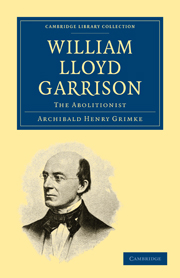Book contents
- Frontmatter
- Preface
- Contents
- CHAPTER I The Father of the Man
- CHAPTER II The Man Hears a Voice: Samuel, Samuel!
- CHAPTER III The Man Begins his Ministry
- CHAPTER IV The Hour and the Man
- CHAPTER V The Day of Small Things
- CHAPTER VI The Heavy World is Moved
- CHAPTER VII Master Strokes
- CHAPTER VIII Colorphobia
- CHAPTER IX Agitation and Repression
- CHAPTER X Between the Acts
- CHAPTER XI Mischief Let Loose
- CHAPTER XII Flotsam and Jetsam
- CHAPTER XIII The Barometer Continues to Fall
- CHAPTER XIV Brotherly Love Fails, and Ideas Abound
- CHAPTER XV Random Shots
- CHAPTER XVI The Pioneer Makes a New and Startling Departure
- CHAPTER XVII As in a Looking Glass
- CHAPTER XVIII The Turning of a Long Lane
- CHAPTER XIX Face to Face
- CHAPTER XX The Death-Grapple
- CHAPTER XXI The Last
- Index
CHAPTER III - The Man Begins his Ministry
Published online by Cambridge University Press: 05 February 2012
- Frontmatter
- Preface
- Contents
- CHAPTER I The Father of the Man
- CHAPTER II The Man Hears a Voice: Samuel, Samuel!
- CHAPTER III The Man Begins his Ministry
- CHAPTER IV The Hour and the Man
- CHAPTER V The Day of Small Things
- CHAPTER VI The Heavy World is Moved
- CHAPTER VII Master Strokes
- CHAPTER VIII Colorphobia
- CHAPTER IX Agitation and Repression
- CHAPTER X Between the Acts
- CHAPTER XI Mischief Let Loose
- CHAPTER XII Flotsam and Jetsam
- CHAPTER XIII The Barometer Continues to Fall
- CHAPTER XIV Brotherly Love Fails, and Ideas Abound
- CHAPTER XV Random Shots
- CHAPTER XVI The Pioneer Makes a New and Startling Departure
- CHAPTER XVII As in a Looking Glass
- CHAPTER XVIII The Turning of a Long Lane
- CHAPTER XIX Face to Face
- CHAPTER XX The Death-Grapple
- CHAPTER XXI The Last
- Index
Summary
Some time in August, 1829, Garrison landed in Baltimore, and began with Lundy the editorship of The Genius of Universal Emancipation. Radical as the Park Street Church address was, it had, nevertheless, ceased to represent in one essential matter his anti slavery convictions and principles. The moral impetus and ground-swell of the address had carried him beyond the position where its first flood of feeling had for the moment left him. During the composition of the address he was transported with grief and indignation at the monstrous wrong which slavery did the slaves and the nation. He had not thought out for himself any means to rid both of the curse. The white heat of the address destroyed for the instant all capacity for such thinking. “Who can be amazed, temperate, and furious—in a moment? No man. The expedition of his violent love outran the pauser reason” He had accepted the colonization scheme as an instrument for removing the evil, and called on all good citizens” to assist in establishing auxiliary colonization societies in every State, county, and town”; and implored “their direct and liberal patronage to the parent society.” He had not apparently, so much as dreamed of any other than gradual emancipation. “The emancipation of all the slaves of this generation is most assuredly out of the question,” he said; “the fabric which now towers above the Alps, must be taken away brick by brick, and foot by foot, till it is reduced so low that it may be overturned without burying the nation in its ruins.
- Type
- Chapter
- Information
- William Lloyd GarrisonThe Abolitionist, pp. 69 - 91Publisher: Cambridge University PressPrint publication year: 2010First published in: 1891



